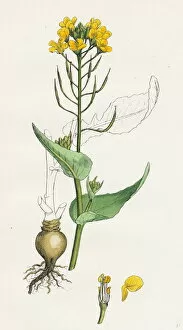Brassica Rapa Collection
"Brassica rapa: Exploring the Versatility of Root Vegetables and Medicinal Plants" Root vegetables, known as "racines alimentaires
All Professionally Made to Order for Quick Shipping
"Brassica rapa: Exploring the Versatility of Root Vegetables and Medicinal Plants" Root vegetables, known as "racines alimentaires, " have been an essential part of our diets for centuries. Among them is Brassica rapa, also referred to as Field Mustard, Bird Rape, Keblock, or Colza Or Rape Seed. This remarkable plant serves not only as a source of food but also possesses medicinal properties. In the realm of agriculture, it has established itself as a valuable crop plant. Its versatility allows it to thrive in various conditions and climates worldwide. With its resilience and adaptability, farmers can rely on this species for consistent yields. Historical engravings from 1895 depict the beauty of Brassica rapa's white round turnips—a testament to its visual appeal. The turnip stern adds another dimension to its aesthetic value while showcasing nature's intricate designs. Beyond aesthetics lies the practicality of Brassica rapa. Commonly known as Common Turnip, this particular variety offers both culinary delights and health benefits. Whether consumed raw or cooked into delectable dishes, these turnips provide a unique flavor profile that enhances any meal. But there's more to Brassica rapa than meets the eye; it holds medicinal significance too. Traditional medicine has recognized its healing properties for ages—utilizing different parts of the plant for various ailments. From soothing digestive issues to boosting immunity, this versatile herbaceous wonder continues to contribute positively towards human well-being. The importance of preserving biodiversity cannot be overstated when considering plants like Brassica campestris (Bee and field mustard). These related species play crucial roles in maintaining ecological balance while providing us with nutritious options. A close-up view reveals an array of root vegetables that include Pak Choi—an Asian leafy green variant within the same family as Brassica rapa. This selection showcases how diverse these crops can be, catering to different culinary preferences and cultural cuisines.












